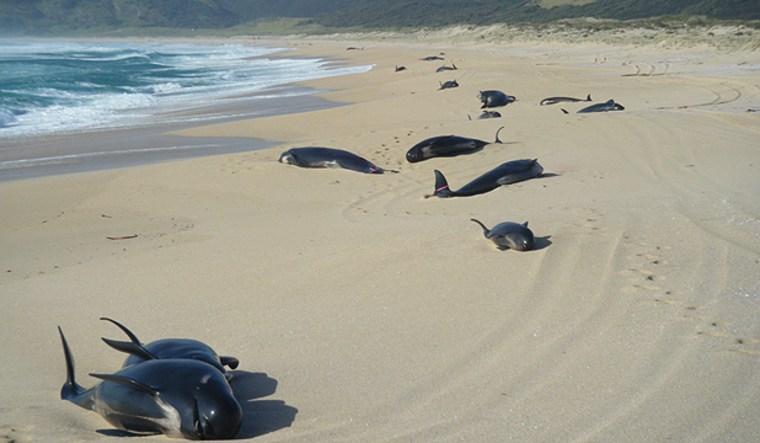At least 40 out of some 80 pilot whales that stranded themselves on a remote northern New Zealand beach have died, and more whales are joining them on land, officials said Wednesday.
It was the second mass beaching in the region in a month.
"More whales are still coming in. Pilot whales have very strong social bonds and they try to help each other so more keep getting stuck," said Mark Simpson of Project Jonah, a charity that protects marine mammals.
"Rescuers are concentrating on trying to move the mammals out of the surf and onto the beach to prevent them from drowning," New Zealand's Department of Conservation said in a statement. "Sadly, many have been washed up against the rocks probably resulting in injuries."
DOC staffer Patrick Whaley said rough seas and gusting winds, some reaching 40 knots, were making it extremely hard to move the animals that were scattered along 1.5 miles of beach.

"It’s heart-wrenching to have to see so many whales coming ashore and then drowning in the surf, without being able to reach them in time," he said.
Whaley said the DOC had already had to make the decision to euthanize some of the weakest and most stressed animals. "It is absolutely cruel to leave them to suffer a slow and painful death," he said.
Conditions at Spirits Bay meant the survivors will have to be taken by road about an hour south to Rarawa Beach on Thursday morning where they will be refloated.
"They will be lifted up with big nets on to the back of trucks with straw or hay loaded on them," Simpson said.
DOC area manager Jonathan Maxwell said at least 25 of the animals were already dead when officials arrived at Spirits Bay, and another 15 had died by nightfall. In addition to the 40 still alive and stuck on the beach, another 50 were spotted just offshore, he said, though some of them had since beached.
Volunteers from Far North Whale Rescue, conservation officials and the local Maori community planned to stay at the beach overnight to help keep the whales alive.
"We need as many volunteers as possible, as it will be at least until tomorrow before we can look at refloating them, which means caring for them over the next 2 days," Maxwell said Wednesday.
In mid-August at nearby Karikari Beach, 58 pilot whales stranded. Despite hundreds of helpers fighting to save them, just nine were eventually floated off the beach and returned to the sea.
A pod of 101 pilot whales stranded on the same beach in 2007.
New Zealand has one of the world's highest rates of whale strandings, mainly during their migrations to and from Antarctic waters, one of which begins around September.
Since 1840, the Department of Conservation has recorded more than 5,000 strandings of whales and dolphins around the New Zealand coast. Scientists have not been able to determine why whales become stranded.
